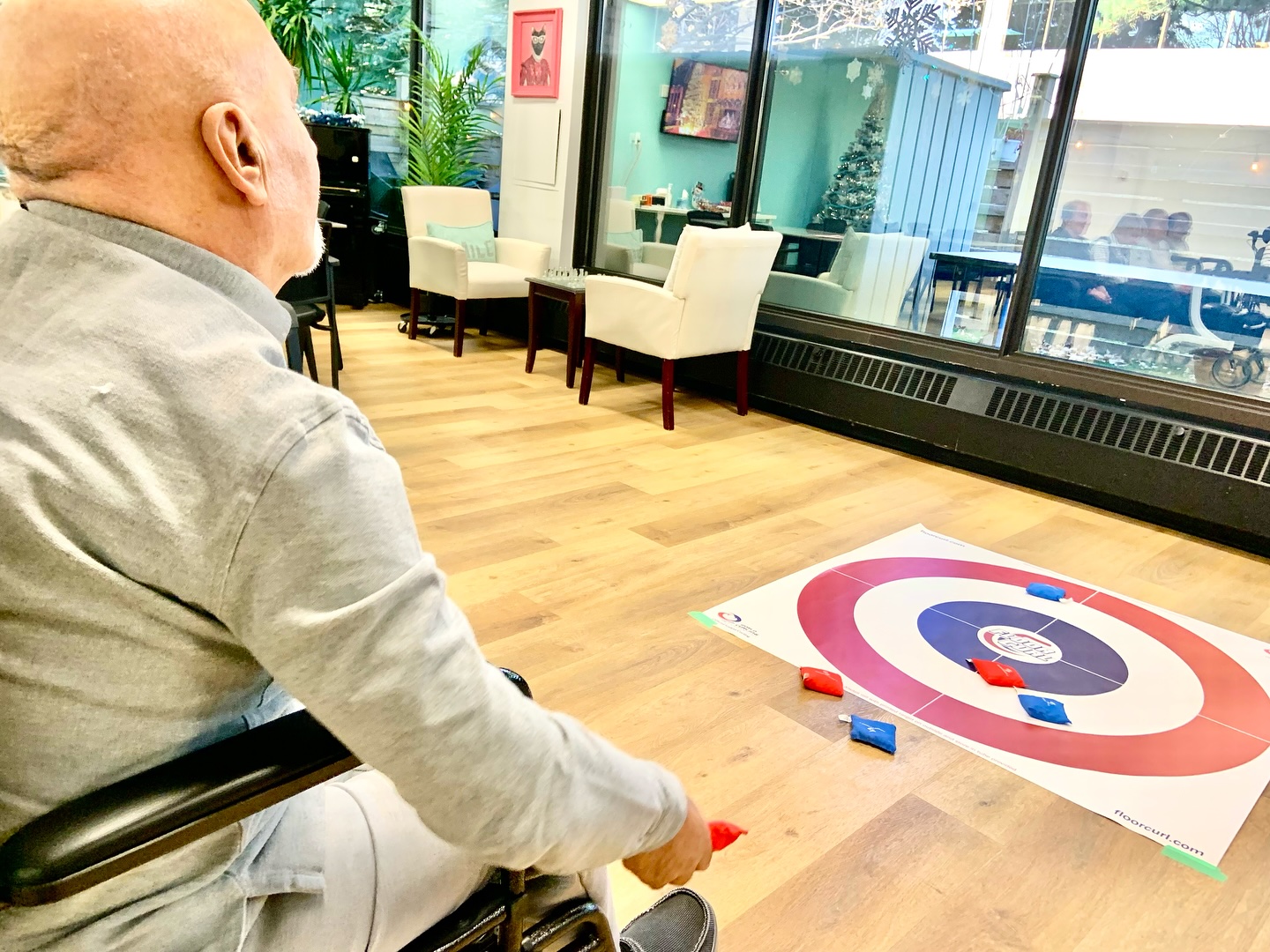It’s that time of year again—the holidays are right around the corner, bringing with them feelings of joy and rejuvenation. But for many care partners, the holidays bring added stress and the risk of burnout, especially for those caring for a person living with Memory Loss. This holiday season, take some time for yourself and make self-care a priority. Respite care during the holiday season can be the best gift you can give yourself (and your loved one living with Memory Loss). Keep reading to learn how care partners can practice self-care and prioritize their physical, mental, and emotional well-being.
Why Self-Care Matters Now More Than Ever
The holiday season is a busy time of year—from shopping for Christmas presents to attending holiday gatherings, we tend to have more obligations in the weeks and days leading up to the big day. People with regular jobs and family responsibilities often have a hard time prioritizing self-care. However, for those who have devoted their life to being a part-time or full-time care partner, it can be near impossible to carve out the time, or energy, for self-care.There are many benefits of self-care. Taking some time for yourself can reduce tension, increase energy, and lower the risk of serious health problems.
Tips for Prioritizing Self-Care
Below are just a few ways you can make self-care a priority.
Plan Ahead and Set Realistic Expectations
There are only 24 hours in a day, and sleep is important. Manage your time better by creating a practical schedule, either using a daily planner or a digital calendar. Map out time for necessary caregiving tasks and appointments. During the holidays, make sure to prioritize visits and gatherings that are vital to both your emotional well-being and that of the person living with Memory Loss.
You can also simplify your life by setting realistic expectations. Understand your limits and only commit to things you know you can handle. This will reduce stress, tension, and anxiety.
Set Boundaries
It is easy to take on more than you can manage, especially during the bustling holiday season. From social gatherings and Christmas parties to community activities, it’s easy to get overwhelmed and find that your “off” time is filled with additional commitments. Learn to politely, but firmly, say no to invitations that bring stress instead of joy. It can be hard to ask for help. Communicate your needs to family members and friends before your responsibilities become overwhelming. Between the regular daily tasks and preparing for the holidays, everyone could use extra help.
Maintain Healthy Habits
A well-balanced diet helps to feed the body and mind. Eating healthy foods can improve cognitive function such as concentration and decision-processing. Your body also requires sufficient nutrients for energy and good health. With all your care partner responsibilities, it can be hard to sit down for a meal. Try eating small but healthy meals and snacks throughout the day instead of one or two large meals. In addition, rest and sleep are vital to your physical, emotional, and mental health. Following a calming bedtime routine can relax your mind and body and improve your sleep. Make sure to get six to eight hours of sleep every night to improve cognitive function and maintain your blood pressure and sugar levels. Lastly, try to incorporate simple exercises into your routine. Exercise, such as walking for as little as 15 minutes a day, can release “feel-good” hormones like dopamine and endorphins. Regular physical activity also supports cognitive function and boosts energy levels.
Stay Connected
Feelings of isolation can be common for care partners, especially if you provide live-in full-time care. It is important to maintain social relationships for your emotional support. Planning virtual gatherings or in-person meet-ups to discuss life experiences, the news of the world, or just for an afternoon of silly chat can emotionally and spiritually lift your spirits. Connect with other Alzheimer’s and dementia care partners through local and online support groups. Being surrounded by others who share similar emotions, experiences, and challenges can give you insight into the importance of being a care partner and foster a sense of community.
Take Time for Yourself
Prioritizing personal time can reduce anxiety, frustration, and feelings of hopelessness you might experience during the holiday season. Set aside time for activities that quiet your mind such as reading or listening to music. Think about what you used to do before you took on the role of a care partner. Maybe you used to have specific hobbies or engaged in various activities that brought you joy and fulfillment. Taking time to re-discover these activities or uncover new ones you enjoy can help reduce stress and bring you happiness.
Practice Mindfulness and Stress Reduction
Mindfulness techniques such as reflection exercises and yoga can help you stay grounded and calm at times of stress or during tense moments. Mindfulness exercises have been shown to reduce anxiety and improve focus. In addition, meditation, progressive muscle relaxation, deep breathing, and emotional support are key to protecting your mental health. These can be accessed with online resources and smartphone apps 24/7 for better convenience.
Embrace Imperfection
Celebrating special occasions such as the holiday season can be stressful under the best circumstances. It is important to focus on joyful moments rather than trying to perfect every moment. Even though you may need to make some modifications for the person living with Memory Loss, it doesn’t mean you can’t maintain family traditions and enjoy the holiday season. Try planning smaller gatherings or activities that are shorter in length.
Prepare for Emotional Moments
Being a care partner is different for everyone and it can be hard to explain the emotional toll it takes to care for another person. Every feeling and emotion experienced is valid—make sure you allow yourself the space to express these emotions in a safe and manageable way. Coping strategies such as writing in a journal or talking to a professional counsellor can help you better manage the mixed emotions you might feel. Try writing down the challenges, feelings, and desires you have. Oftentimes, it can alleviate the “emotional weight” of the situation.
Leverage Professional Support
Sharing your responsibilities helps to alleviate some of the physical and emotional stress you might experience while caring for someone living with Memory Loss. Overnight respite care for adults provides a much-needed break for care partners, as well as the person living with Memory Loss. Services often include daily living activities, recreation programs, and social gatherings.
A Memory Care environment has trained and knowledgeable Team Members who have experience in assisting and supporting those living with dementia and other Memory Loss conditions. They offer help for Alzheimer’s care partners by providing resources such as overnight respite care, workshops, and support groups.
Discover Memory & Company
Memory & Company is a Memory Care setting that offers specialized services to support those living with a form of Memory Loss and their care partner(s). As the world’s first Respite Hotel, we offer a safe and stimulating living environment with short and long-term accommodations. All of our Team Members have experience supporting people living with Memory Loss.
Hear from Our Community
"As a new caregiver, I was very nervous about leaving my mom (with dementia) under anyone’s supervision; afraid they wouldn’t understand her needs. After seeing the cleanliness, staff attentiveness, and scope of their activities program at Memory & Company, I felt very comfortable with the attention to every detail of care. When I need a break, it's like booking her into a fancy all-inclusive resort that even has spa options available. My mom now calls it her 'Entertainment Centre,' so I feel good when I leave her in their capable hands." – Donna S.
We're Here to Support You – Schedule a Tour at Memory & Company Today!
At Memory & Company, our primary concern is the individual living with Memory Loss AND their care partner(s). Our dedicated, certified personnel utilize contemporary programs and technology to tailor care to each unique individual. For our Members, we apply scientifically backed cognitive and physical initiatives aimed at decelerating the progression of Memory Loss. We understand that care partners can also become overwhelmed, and therefore, we provide an inclusive, secure, and understanding setting that is free from judgement for both the Member and the care partner. Let us provide the best care for your loved one while you take care of yourself with one of our short-term and long-term accommodations, including our Premium Day Program.
Contact us today at (905) 888-8808 or email us at info@memoryandcompany.com to schedule a personal tour at our Markham or Oakville location.






















